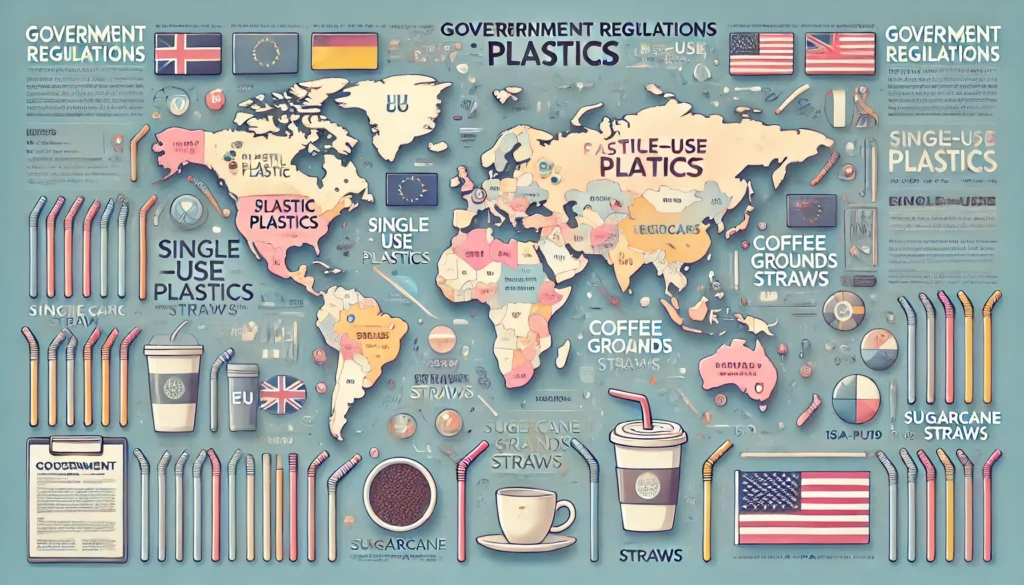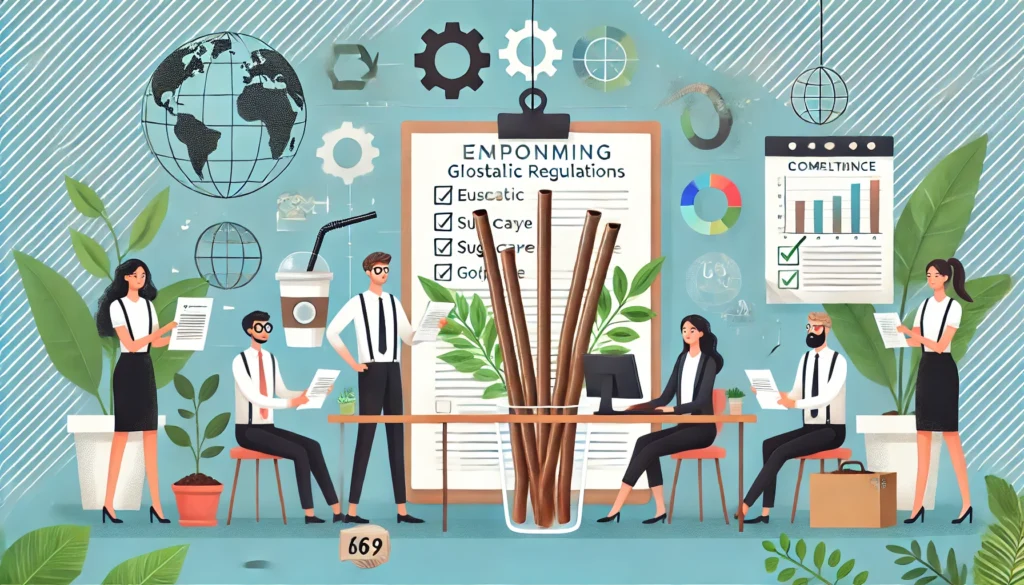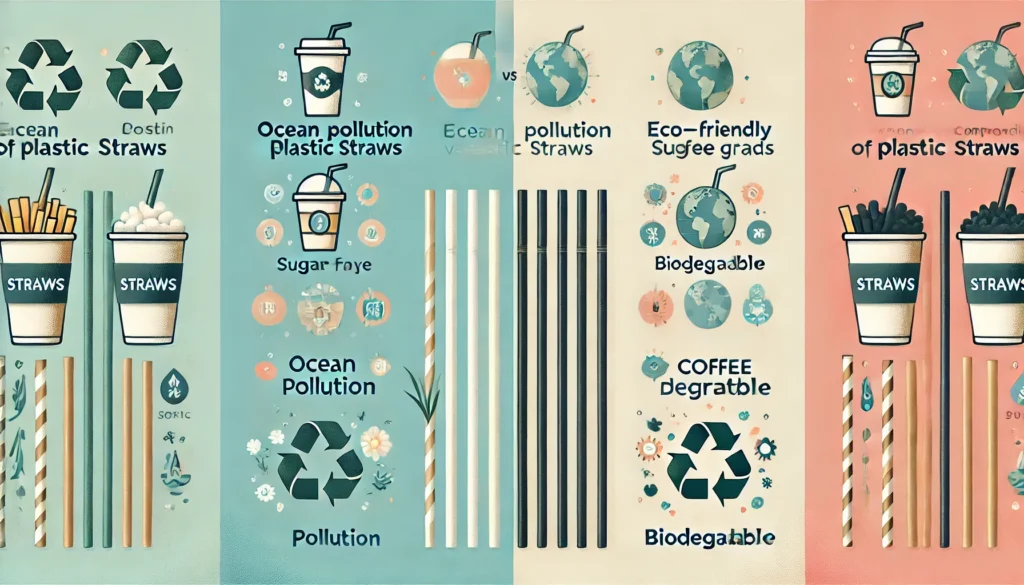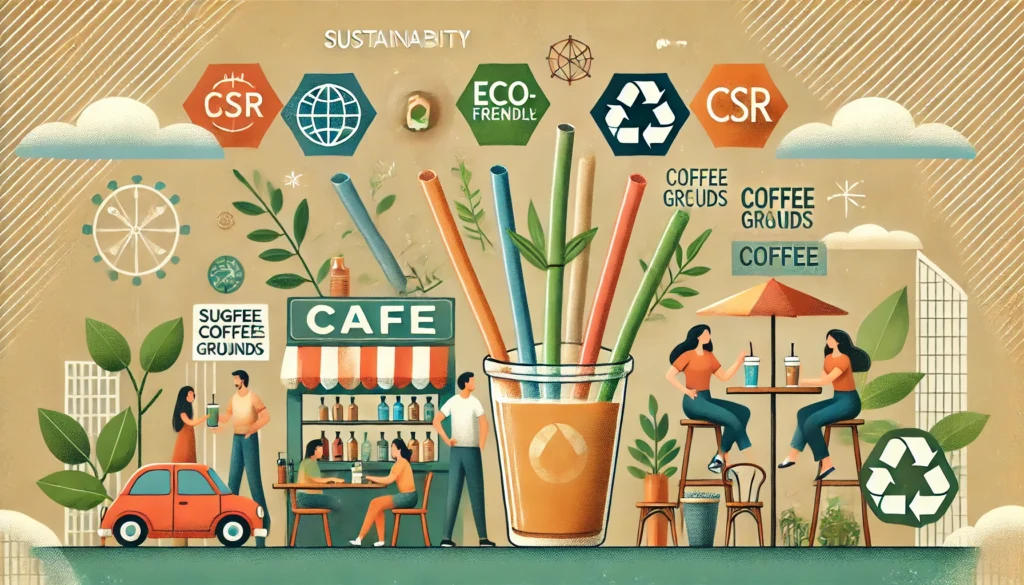1. Introduction: Government-Led Change in Plastic Use
Governments worldwide are taking decisive actions to address the escalating environmental crisis caused by single-use plastics. Among the most visible culprits of this crisis are plastic straws, which are used in staggering numbers and contribute significantly to ocean and landfill pollution. These tiny items, though convenient, symbolize the larger issue of unsustainable consumption.
The push for regulations banning plastic straws reflects not just a compliance necessity but a broader societal shift toward environmental responsibility. Eco-friendly straws have become emblematic of this change, highlighting the need for businesses to adapt to evolving standards and meet the growing demand for sustainable solutions.

2. Key Regulations by Region
2.1 European Union (EU)
The European Union has set a global benchmark with its Single-Use Plastics Directive, effective since July 2021. This landmark legislation bans plastic straws, cutlery, and other single-use items across all member states. The directive prioritizes biodegradable and compostable alternatives, urging businesses to innovate and adopt sustainable practices.
European companies have demonstrated resilience and adaptability, quickly transitioning to eco-friendly products. The adoption of alternatives like sugarcane and paper straws has not only ensured compliance but also strengthened their commitment to sustainability, enhancing their reputations in the process.
2.2 United States (US)
In the United States, regulatory efforts have been more fragmented, with states and cities implementing their own plastic reduction laws.
- California: The first state to pass legislation banning plastic straws in restaurants unless requested by customers.
- New York: Restrictions on single-use plastics, including straws, have gained traction.
- Seattle and San Francisco: Local governments have introduced comprehensive bans on plastic straws and other single-use plastics.
While these initiatives are commendable, businesses operating across multiple states face challenges due to the lack of uniform regulations. Navigating this patchwork of laws requires meticulous planning and proactive adoption of sustainable alternatives.

2.3 Asia-Pacific
The Asia-Pacific region has emerged as a leader in the fight against plastic waste.
- China: A nationwide ban on plastic straws came into effect in 2021, marking a significant step toward sustainability.
- India: Ambitious goals to eliminate single-use plastics by 2022 have inspired businesses to innovate with biodegradable alternatives.
- Australia: States such as Queensland and South Australia have introduced bans on plastic straws, reflecting a growing regional commitment to sustainability.
These regulatory shifts not only reduce plastic waste but also create opportunities for businesses to cater to a burgeoning market of eco-conscious consumers.
3. How Regulations Affect Businesses
3.1 Compliance Requirements
Businesses must navigate strict compliance standards when transitioning to eco-friendly straws. Certifications like FDA approval, LFGB testing, and EU Compostability Certification validate the quality and safety of products. Understanding and adhering to these requirements is essential for businesses aiming to meet both legal and consumer expectations.

3.2 Challenges for Businesses
Transitioning to eco-friendly materials presents several challenges:
- Higher Initial Costs: The upfront expense of biodegradable materials can strain budgets.
- Supply Chain Adjustments: Sourcing high-quality sustainable materials may disrupt established supply chains.
However, these challenges are short-term and can be mitigated through strategic planning and partnerships with reliable suppliers.
3.3 Opportunities Created by Legal Shifts
Regulatory changes also present unique opportunities:
- Competitive Advantage: Early adopters of eco-friendly solutions position themselves as industry leaders.
- Enhanced Brand Reputation: Marketing compliance with environmental regulations bolsters consumer trust and loyalty.
Businesses that align their operations with sustainability not only meet legal standards but also create a lasting impact on their brand image.
4. Future Trends in Regulation
4.1 Anticipated Bans and Restrictions
Experts predict that by 2030, most single-use plastics, including packaging and utensils, will face global bans. This expansion will necessitate further innovation in biodegradable and reusable alternatives, making early preparation vital for businesses.
4.2 Incentives for Compliance
Governments are expected to introduce financial incentives, such as subsidies and tax breaks, to encourage businesses to adopt sustainable practices. Companies showcasing compliance in their CSR reports may also gain competitive advantages, attracting eco-conscious investors and customers.
4.3 Growing Importance of Circular Economy Practices
The concept of the circular economy emphasizes waste reduction through reuse and recycling. Eco-friendly straws, designed to decompose naturally, play a pivotal role in advancing this model, offering businesses a chance to actively contribute to sustainable production and consumption cycles.
5. The Rise of Eco-Friendly Straws as a Business Opportunity
Businesses can capitalize on the rise of eco-friendly straws by offering innovative and customizable options. Products like sugarcane and coffee grounds straws meet both regulatory and consumer demands for sustainable alternatives.
Partnering with certified suppliers ensures access to high-quality products that align with legal standards. Companies like NatureBioEco provide reliable eco-friendly solutions tailored to the needs of forward-thinking businesses.
Aligning sustainability with profitability is not only possible but essential. Meeting the expectations of eco-conscious consumers creates new revenue streams while reinforcing brand values.

6. Conclusion: Proactively Preparing for Policy Changes
The evolution of government regulations marks a pivotal shift in how businesses approach sustainability. Early adoption of eco-friendly practices helps businesses avoid penalties, gain competitive advantages, and position themselves as industry leaders.
Companies are urged to evaluate their current reliance on single-use plastics and explore sustainable alternatives proactively. By embracing these changes, businesses can transform compliance challenges into opportunities for growth and innovation, contributing to a healthier planet for future generations.









